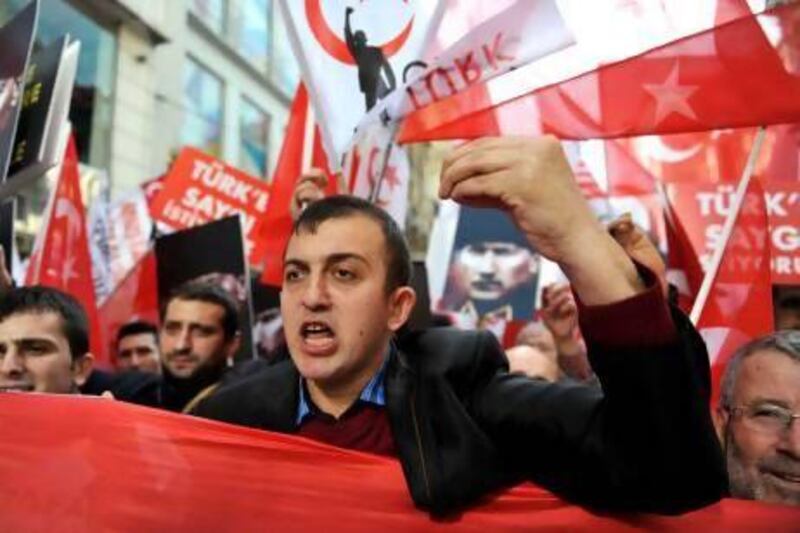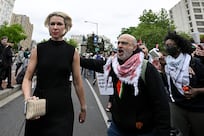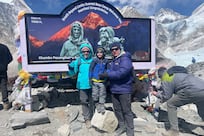ISTANBUL // Protests by Turkish nationalists against the government's initiative to end a decades-long war with Kurdish militants show that reconciliation will not be achieved overnight, analysts say.
The government of Recep Tayyip Erdogan, the prime minister, has been involved in peace negotiations with Abdullah Ocalan, the jailed Kurdish rebel leader who is seen as public enemy Number One by Turkish nationalists.
As a result of the peace talks, Ocalan last month called on the Kurdistan Workers' Party (PKK) that he founded to stop attacks on security forces and withdraw its estimated 1,500 fighters from Turkey to rebel camps in northern Iraq. No clashes between security forces and rebels have been reported since then.
Nationalists, angry about what they see as a sell-out to Kurdish separatists, waved flags and heckled members of a "Wise Men's Council", a group of intellectuals, academics and artists brought together by the government to sell the initiative to the public, in the streets of the city of Zonguldak last week. The council members needed a police escort to leave the scene.
Later that day, protesters crashed a panel organised by the council at a Zonguldak hotel, denouncing the peace initiative as an attempt to weaken Turkey.
"You will be squashed under the heels of the Turkish nation," the protesters cried, according to news reports. Following the Zonguldak protests, the government ordered local authorities to step up security for the "Wise Men".
The protests show how hard it may be for Turks and Kurds to overcome decades of violence that has killed more than 40,000 people since PKK rebels took up arms to fight for Kurdish self-rule in 1984.
"We don't believe in this process," a protester in Zonguldak, who did not want to be named, said by telephone. He said the government refused to say what kind of concessions it was prepared to make to the Kurds. "We don't believe in it, so we showed them the Turkish flag."
While the PKK's concessions for peace - withdrawal from Turkey followed by a destruction or handover of the rebels' weaponry - are clear, it is not known what the Turkish state will do in return. The PKK and Kurdish politicians have called for a guarantee of Kurdish rights, possibly under the new constitution being drafted in parliament, but the government has not publicly committed to anything.
Turkish nationalists say they are concerned that Mr Erdogan will grant partial self-rule to the country's 13 million Kurds, who predominantly live in south-eastern Turkey, and use the peace initiative as a political trump card to win presidential and parliamentary elections in 2014 and 2015.
Mr Erdogan told MPs from his Justice and Development Party (AKP) last week that support for the Kurdish initiative stood at 68 per cent of voters. Both the secularist Republican People's Party (CHP) and the right-wing Nationalist Movement (MHP), the two biggest opposition groups, have rejected it.
Unease by nationalists about the secretive give-and-take between Ocalan and the government is not the only problem. Sociologists say decades of war have resulted in a deep divide between the Turkish majority and Kurds, who make up about 18 per cent of the population, that will be slow to heal.
Many Kurds say they feel they are treated like second-class citizens and with suspicion by Turks. The PKK started its armed struggle in part as a response to the brutal treatment of many Kurds after the military coup of 1980, when thousands were jailed and tortured.
Leyla Neyzi and Haydar Darici, sociologists at Istanbul's Sabanci University, this month published a book based on interviews with Turkish and Kurdish youth that suggested that hostility is high, especially from the Turkish side.
"Reconciliation will take a long time mostly because of resistance on the part of the majority, that is those who identify as Turks," Ms Neyzi said.
"Kurdish youth are caught between elation and anxiety" over the chance of peace that the government initiative could bring, she said. "Turkish youth, on the other hand, need to realise that this process is an opportunity for them to come to terms with the past, to look themselves and their country in the eye in an honest and forthright manner."
Turks cited in the book were blunt about their opinion of Kurds, attributing their attitudes to attacks by Kurdish militants against Turkish soldiers. "If I see some [Kurds] on the street, I insult them," said one of the subjects. Young Kurds were also scarred by the war, with one subject saying Turkish youth in the west of the country were sheltered from fighting in the south-east. "That was an injustice."
Despite the differences expressed in the interviews, Ms Neyzi said she was hopeful that the peace process could bring Turks and Kurds closer together.
"I do believe the political process under way in Turkey provides hope for reconciliation, provided the government makes concrete changes in the constitution, in the sphere of law, and education."
tseibert@thenational.ae
twitter: For breaking news from the Gulf, the Middle East and around the globe follow The National World. Follow us






